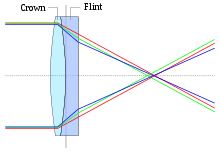Doublet (lens)
In optics, a doublet is a type of lens made up of two simple lenses paired together. Such an arrangement allows more optical surfaces, thicknesses, and formulations, especially as the space between lenses may be considered an "element." With additional degrees of freedom, optical designers have more latitude to correct more optical aberrations more thoroughly.
Types
Doublets can come in many forms, though most commercial doublets are achromats, which are optimized to reduce chromatic aberration while also reducing spherical aberration and other optical aberrations. The lenses are made from glasses with different refractive indices and different amounts of dispersion. Often one element is made from crown glass and the other from flint glass. This combination produces a better image than a simple lens. Some Trilobites, which are now extinct, had natural doublet lenses in their eyes.[1] Apochromats can also be made as doublets.
Doublets can be air-spaced, cemented, or "oiled." Oiled doublets hold the optical fluid in place with surface tension alone. In a cemented doublet, the lenses are held together by an adhesive with mechanical strength, such as optically transparent epoxy. Canada balsam was traditionally used for this purpose. Some doublets use no adhesive between the lenses, relying on external fixturing to hold them together, either because the optical design requires a gap or because thermal expansion differences between the two lenses won't allow cementing.[2] These are called "un-cemented", "air-spaced" or "broken contact" doublets.[3] A sub-type of air-spaced doublet is the dialyte, a design where elements are widely spaced to save on the amount of glass used or where the elements cannot be cemented because they have strongly dissimilar curvatures.[4]
See also
References
- ↑ Clarkson, E. N. K.; Levi-Setti, R. L. (1975), "Trilobite eyes and the optics of Descartes and Huygens", Nature, 254 (5502): 663–7, Bibcode:1975Natur.254..663C, doi:10.1038/254663a0, PMID 1091864
- ↑ Fred A. Carson, Basic optics and optical instruments, page 4-32
- ↑ A guide to instrument design – Scientific Instrument Manufacturers' Association of Great Britain, British Scientific Instrument Research Association, page 184
- ↑ Fred A. Carson, Basic optics and optical instruments, page AJ-4
